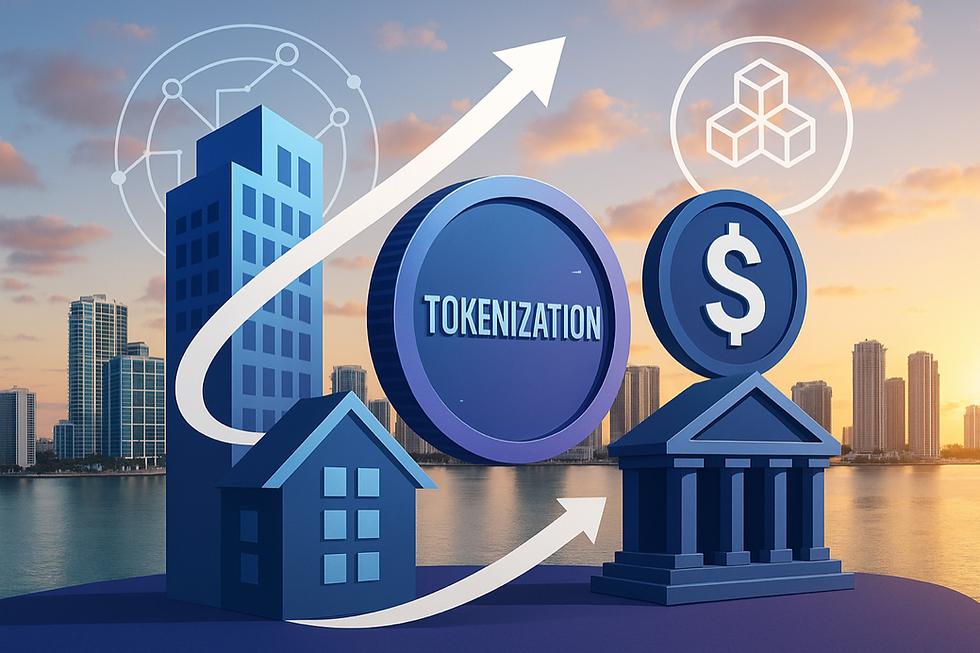Exploring the Intersection of Crypto, Real Estate, and Investment Strategies
- Meggen Harris

- Aug 13, 2025
- 4 min read
Updated: Aug 27, 2025

In recent months, the investment landscape has witnessed significant shifts, particularly concerning the integration of cryptocurrency and alternative assets into traditional financial structures like 401(k) plans. With President Trump’s executive order easing access to alternative investments, including private equity and cryptocurrency in retirement accounts, the financial industry is abuzz with both excitement and skepticism. This article will delve into these developments, the convergence of cryptocurrency and real estate, and the growing trend of tokenizing real-world assets (RWAs).
Trump's Executive Order: Expanding 401(k) Investments with Alternative Assets
On August 8, 2025, President Trump signed an executive order that allows individuals to include alternative assets—such as private equity, cryptocurrency, and real estate—in their 401(k) plans. This move is significant as it broadens the investment options available to retirement savers, potentially enhancing their portfolios' performance. As reported by Democracy Now!, this executive order has generated considerable debate regarding the risks and benefits associated with investing in more volatile assets within retirement accounts. Proponents argue that these alternative investments can provide higher yields and diversification, while critics worry about the lack of regulation and the potential for losses in what should be a secure retirement fund.
The introduction of alternative investments into 401(k) plans is not just a fleeting trend; it reflects a broader shift in how individuals view retirement savings. High-net-worth individuals, in particular, are increasingly seeking ways to leverage their assets, including cryptocurrency, to maximize returns. As the landscape evolves, it will be crucial for investors to navigate the complexities and risks associated with these new options.
The Convergence of Crypto and Real Estate Investments
The convergence of cryptocurrency and high-end real estate is another compelling aspect of this evolving investment narrative. AInvest highlights this trend, noting that privacy concerns among wealthy individuals are driving the demand for crypto transactions in real estate purchases. Initiatives such as Christie's crypto real estate division underscore this shift, as luxury properties are increasingly being sold for cryptocurrency. This intersection not only reflects the growing acceptance of digital currencies but also illustrates how blockchain technology can enhance transaction transparency and security.
As cryptocurrency becomes more integrated into high-value real estate transactions, it raises questions about the future of real estate investment. With pro-crypto policies under the current administration, investors are more inclined to explore these innovative avenues, potentially reshaping the real estate market. The ability to use digital assets for significant investments may attract a new demographic of buyers who prioritize privacy and technological advancement.
Tokenization of Real-World Assets: Transforming Investment Opportunities
In tandem with these developments, the tokenization of RWAs is emerging as a significant trend within the investment community. As reported by RedStone, the market for tokenized private credit has seen explosive growth, surpassing $24 billion in value by June 2025. This shift toward blockchain-based solutions is indicative of a broader movement to enhance liquidity, transparency, and efficiency in financial transactions.
Tokenization allows for the fractional ownership of assets, enabling investors to access high-value opportunities that were previously out of reach. This democratization of investment is particularly relevant in the context of private credit, where traditional barriers to entry often limit participation. By leveraging blockchain technology, investors can enjoy higher yields and faster access to capital, transforming how they engage with financial markets.
The implications of tokenization extend beyond mere investment returns. They signal a fundamental change in how assets are perceived and managed. As investors become more comfortable with digital assets and blockchain technology, traditional financial institutions may need to adapt to remain competitive in this rapidly evolving landscape.
Conclusion
The recent executive order by President Trump has opened the door for alternative investments within 401(k) plans, igniting a conversation about the future of retirement savings and investment strategies. The intersection of cryptocurrency and high-end real estate presents new opportunities for wealthy individuals seeking privacy and innovation in their transactions. Moreover, the rapid growth of tokenized RWAs indicates a shift toward more accessible and efficient investment options.
As the financial landscape continues to evolve, investors must stay informed about these trends and the potential risks involved. The integration of cryptocurrency and alternative assets into traditional financial structures is not just a passing trend; it represents a significant transformation in the way we approach investing in the modern age.
Ready to explore how Participant Capital can enhance your investment portfolio?
Contact us today to learn more about our tailored solutions and how we can help you take advantage of the latest trends in the financial market.
References
Democracy Now! (2025). Trump Opens Path for Private Equity and Cryptocurrency Investments in 401(k) Plans. Retrieved from Democracy Now!
Bloomberg (2025). Private Credit Goes Big on Open-Ended Funds to Lure Retail Cash. Retrieved from Bloomberg
ETF Trends. The Case for Private Credit in Today's Modern Client Portfolio. Retrieved from ETF Trends
Disclaimer: This blog post is for informational purposes only and does not constitute an offer to sell or a solicitation of an offer to buy any securities. Investment opportunities referenced herein are intended solely for accredited investors and may be offered only through appropriate offering documents. Past performance is not indicative of future results. Investing involves risk, including the possible loss of principal. Participant Capital does not provide tax or legal advice; individuals should consult their own advisors to understand the potential tax consequences. Views expressed are those of the authors and do not necessarily reflect the official views of Participant Capital or its affiliates.




Comments